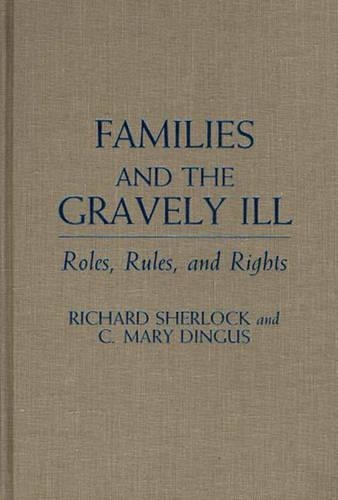
Families and the Gravely Ill: Roles, Rules, and Rights
(Hardback)
Publishing Details
Families and the Gravely Ill: Roles, Rules, and Rights
By (Author) C Mary Dingus
By (author) Richard Sherlock
Bloomsbury Publishing PLC
Praeger Publishers Inc
26th September 1988
United States
Classifications
Tertiary Education
Non Fiction
174.2
Physical Properties
Hardback
201
Description
This volume joins other recently published works on the ethical and legal considerations of life-sustaining treatments. Sherlock and Dingus focus on medical decision making involving children and incompetent adults, and the issue of how these decisions should be made. Discussion begins with the various meanings of family and the psychosocial issues in family involvement. The authors explore differences in decision making for the incompetent adult and for the child, and consider the pros and cons of family decision making as well as alternative decision making methods. They argue for an ethics committee review of selected difficult cases. The use of relevant cases to depict the legal aspects involved in medical decision making for children and incompetent adults helps clarify the issues involved. . . . A valuable reference for graduate or professional collections. Choice Written by a specialist in medical ethics and a practicing medical psychologist, this book is a comprehensive review of the complex issues involved in family decisionmaking in medicine. Although much has been written about the treatment of seriously ill patients, little has been written about those involved in the complicated decisionmaking process for incompetent patients. This volume, therefore, fills an important gap in the literature. In addition to treating general issues in ethics and psychology, the authors also address the realities of actual clinical decisionmaking, setting their work apart from more traditional studies of medical ethics.
Reviews
This volume joins other recently published works on the ethical and legal considerations of life-sustaining treatments. Sherlock and Dingus focus on medical decision making involving children and incompetent adults, and the issue of how these decisions should be made. Discussion begins with the various meanings of "family" and the psychosocial issues in family involvement. The authors explore differences in decision making for the incompetent adult and for the child, and consider the pros and cons of family decision making as well as alternative decision making methods. They argue for an ethics committee review of selected difficult cases. The use of relevant cases to depict the legal aspects involved in medical decision making for children and incompetent adults helps clarify the issues involved. The appendix contains statutory and case law in the 24 states that have some law relevant to family involvement in medical decision making. Includes an extensive bibliography of works dealing with the ethical/legal issues and case law involved in terminal care, life-sustaining measures, and decision making for children and incompetent adults. A valuable reference for graduate or professional collections.-Choice
"This volume joins other recently published works on the ethical and legal considerations of life-sustaining treatments. Sherlock and Dingus focus on medical decision making involving children and incompetent adults, and the issue of how these decisions should be made. Discussion begins with the various meanings of "family" and the psychosocial issues in family involvement. The authors explore differences in decision making for the incompetent adult and for the child, and consider the pros and cons of family decision making as well as alternative decision making methods. They argue for an ethics committee review of selected difficult cases. The use of relevant cases to depict the legal aspects involved in medical decision making for children and incompetent adults helps clarify the issues involved. The appendix contains statutory and case law in the 24 states that have some law relevant to family involvement in medical decision making. Includes an extensive bibliography of works dealing with the ethical/legal issues and case law involved in terminal care, life-sustaining measures, and decision making for children and incompetent adults. A valuable reference for graduate or professional collections."-Choice
Author Bio
RICHARD SHERLOCK is Associate Professor of Language and Philosophy at Utah State University. C. MARY DINGUS is a Clinical Psychologist at the Veterans Administration Medical Center, Seattle, Washington, and Clinical Instructor, Department of Psychiatry and Behavioral Sciences, University of Washington Medical School.
